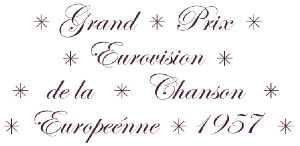
The Eurovision Song Contest 1957 was the second edition of the annual Eurovision Song Contest. Organised by the European Broadcasting Union (EBU) and host broadcaster Hessischer Rundfunk (HR) on behalf of ARD, the contest, originally known as the Grand Prix Eurovision de la Chanson Européenne 1957 was held on Sunday 3 March 1957 and was hosted at the Großer Sendesaal des hessischen Rundfunks in Frankfurt, West Germany by German actress Anaid Iplicjian.

ARD is a joint organisation of Germany's regional public-service broadcasters. It was founded in 1950 in West Germany to represent the common interests of the new, decentralised, post-war broadcasting services – in particular the introduction of a joint television network.
Tagesschau is a German national and international television news service produced by the editorial staff of ARD-aktuell on behalf of the German public-service television network ARD.
Westdeutscher Rundfunk Köln, shortened to WDR, is a German public-broadcasting institution based in the Federal State of North Rhine-Westphalia with its main office in Cologne. WDR is a constituent member of the consortium of German public-broadcasting institutions, ARD. As well as contributing to the output of the national television channel Das Erste, WDR produces the regional television service WDR Fernsehen and six regional radio networks.
Television in Germany began in Berlin on 22 March 1935, broadcasting for 90 minutes three times a week. It was home to the first public television station in the world, named Fernsehsender Paul Nipkow.

Hessischer Rundfunk, shortened to HR, is the German state of Hesse's public broadcasting corporation. Headquartered in Frankfurt, it is a member of the national consortium of German public broadcasting corporations, ARD.

Norddeutscher Rundfunk, commonly shortened to NDR, is a public radio and television broadcaster, based in Hamburg. In addition to the city-state of Hamburg, NDR broadcasts for the German states of Lower Saxony, Mecklenburg-Vorpommern and Schleswig-Holstein. NDR is a member of the ARD organisation.
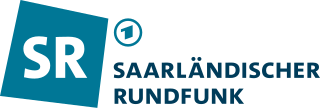
Saarländischer Rundfunk, shortened to SR, is a public radio and television broadcaster serving the German state of Saarland. With headquarters in the Halberg Broadcasting House in Saarbrücken, SR is a member of the ARD consortium of German public-broadcasting organizations.

Astra Digital Radio (ADR) was a system used by SES for digital radio transmissions on the early Astra satellites, using the audio subcarrier frequencies of analogue television channels. It was introduced in 1995. As of February 2008, there were still 51 stations transmitting in this format. ADR ceased on 30 April 2012 when analogue broadcasts on Astra 19.2°E ended.
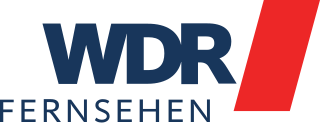
WDR Fernsehen is a German free-to-air television network owned and operated by Westdeutscher Rundfunk and serving North Rhine-Westphalia. It is one of the seven regional "third programmes" television stations that are offered within the federal ARD network.

ATV is the largest commercial television station in Austria, and was the first commercial station to be aired via transmitters after a long time when commercial broadcasts in Austria were only possible via satellite or cable and the national public broadcaster ORF held a monopoly of using the airwaves.

NDR Fernsehen is a German free-to-air regional television channel targeting northern Germany, specifically the states of Schleswig-Holstein, Lower Saxony, Mecklenburg-Vorpommern, Hamburg and Bremen.
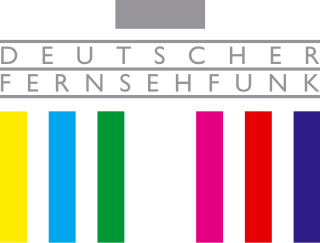
Deutscher Fernsehfunk was the state television broadcaster in the German Democratic Republic from 1952 to 1991.
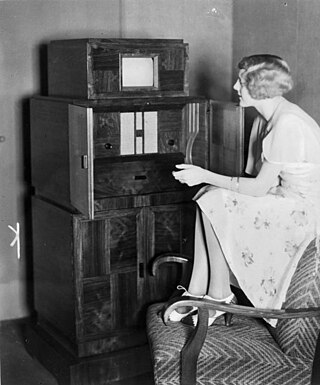
The first regular electronic television service in Germany began in Berlin on March 22, 1935, as Deutscher Fernseh Rundfunk. Broadcasting from the Fernsehsender Paul Nipkow, it used a 180-line system, and was on air for 90 minutes, three times a week. Very few receivers were ever privately owned, and viewers went instead to Fernsehstuben. During the 1936 Summer Olympics, broadcasts, up to eight hours a day, took place in Berlin and Hamburg. The Nazis intended to use television as a medium for their propaganda once the number of television sets was increased, but television was able initially to reach only a small number of viewers, in contrast to radio. Despite many technical improvements to camera technology, allowing for higher resolution imaging, by 1939, and the start of World War II, plans for an expansion of television programming were soon changed in favor of radio. The production of the TV receiver E1, that had just started was cancelled because of the war. Nevertheless, the Berlin station, along with one in occupied Paris, remained on the air for most of World War II. A special magazine called Fernsehen und Tonfilm was published.
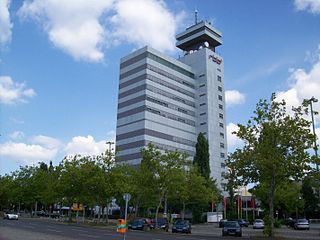
RBB Fernsehen is a German free-to-air television channel owned and operated by Rundfunk Berlin-Brandenburg (RBB) and serving Berlin and Brandenburg. It is one of the seven regional "third programmes" that are offered within the federal ARD network.

hr-info is a German, public radio station owned and operated by the Hessischer Rundfunk (HR). The slogan of the station is Wer’s hört, hat mehr zu sagen. Former slogans were hr info – Radio im Klartext and Das Wichtige wissen.
maintower is the tabloid magazine of the Hessischer Rundfunk broadcast on hr-fernsehen from Monday to Friday at 6:00 pm.
Kowalski & Schmidt is a German-Polish television magazine with topics from everyday life, culture, politics, science and the social sector, is jointly presented by Adriana Rozwadowska and Martin Adam alternately in Germany and Poland.
Degeto Film GmbH is a film rights trader and production company of the ARD, based in Frankfurt am Main. Its shareholders are the regional broadcasting corporations of ARD or their advertising subsidiaries.
















